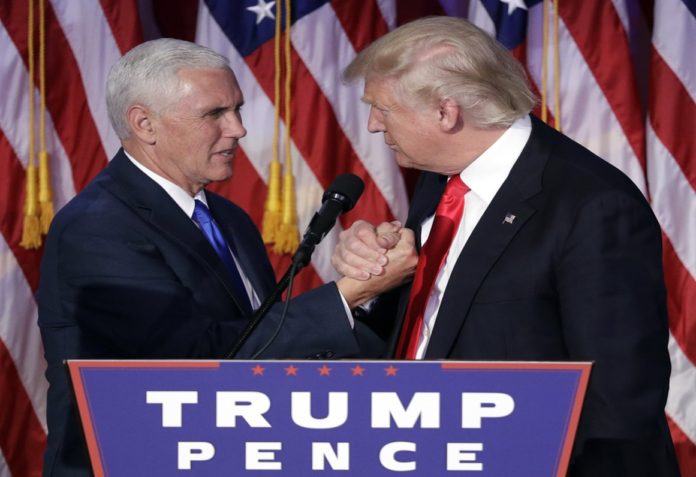Donald Trump’s victory has caught the World by its throat, and in all likelihood, we are in for interesting times. The first post-election Trump-Obama summit showed a grim looking Obama trying to put up a brave face. Every analyst is busy in separating Donald J Trump’s electoral rhetoric into pursuable and abandon-able categories. However, his campaign guys, in the hope of grabbing lucrative jobs, are busy gathering arguments to support the notion that all that Trump uttered as a candidate was gospel truth and it could be implemented in letter and spirit.
Trump too is in no mood to show flexibility, at least for the time being. As of now, he seems adamantly fixated into some regressive ideals of yesteryears whose implementation could do more harm than good to the US. Banning the entry of Muslims, tearing apart the Iran nuclear deal, watering down support to Palestinian right to statehood, strict immigration measures including medieval concepts of wall building and electrified fencing, retooling trade relations with China, incorporating protectionist trade regime in favour of the US; withholding ratification of 12-nationTrans Pacific Partnership (TPP) etc. are just some of Trump’s day dreams—which may turn into nightmares for his country. The good things include: toning down post Crimea neo-cold war rhetoric with Russia alongside enhancing multi-dimensional cooperation, asking Europe to take more financial responsibility of their defence, offer to mediate between India and Pakistan on Kashmir dispute, etc.
His victory presents an interesting case study oscillating between “democracy at its best” and democracy at its worst”. It is perhaps the biggest political upset that America has ever seen in its electoral history. Important capitals are bending backwards to accommodate the inevitable. The uncertainty engulfing the world is attributable to the fact that Trump did not elaborate his foreign policy—rather any policy— during his election campaign. His utterances on policy issues were patchy rhetoric than sustainable projections. To add to the uncertainty this is the first time that Trump will be holding an elected position. He has no previous political experience and exposure.
Like the entire World, no one took Trump seriously in Pakistan as well, perhaps Trump also thought the same way. Important capitals overwhelmingly took Hillary’s presidency for granted, and that too for two terms. While Trump’s policy towards Pakistan and the region would unfold in due course, there is consensus among Pakistani government officials, foreign policymakers and independent experts that ‘divorce’ is not an option for either country. Lucky that Pakistani government held back the temptation to outrightly jump on the Hillary bandwagon; during the campaign the foreign office had welcomed Trump’s offer to play his role to diffuse tensions between India and Pakistan.
Prime Minister Nawaz Sharif promptly felicitated Trump: “Your election is indeed the triumph of the American people and their enduring faith in the ideals of democracy, freedom, human rights and free enterprise”. Immediately after the electoral results, US Consul General in Karachi, Grace Shelton, sought to assure that Trump’s election did not signal a drastic policy change. “Our foreign policy is based on national interest and they don’t change when the government changes.”
While Hillary conceded promptly in line with American post electoral norms the pressure group under the brand name “We the people” acted differently. A large number of Americans came out in the streets to vent their frustration over the electoral outcome. In America as well as in Western democracies, public demonstrations against the popular mandate are a rare spectacle. People were out on streets to express their disapproval of Trump’s popular mandate. Protesters rallied across the United States to express shock over Trump’s victory, vowing to ‘oppose divisive views they say helped Trump win the presidency’. Protesters held banners saying ‘not my president’. Notwithstanding this sentiment, unless something goes wrong drastically, Trump would be the President of the United States on January 20, 2017.
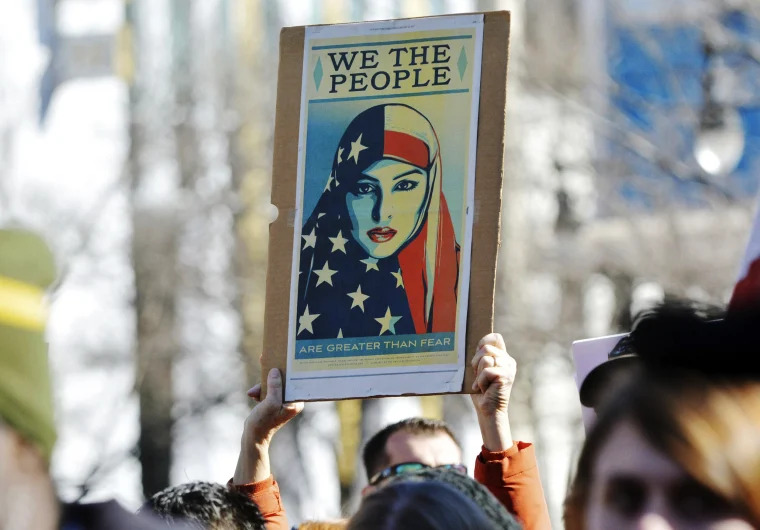
Trump too is adjusting to the reality, yet sending mixed and confusing signals; maybe he wasn’t sure of his victory either. A controversial message posted on his website on December 7, 2015 was removed. “Donald J Trump is calling for a total and complete shutdown of Muslims entering the United States until our country’s representatives can figure out what is going on,” the message had said. The page was available till the morning of the Election Day, however a dubious redirect was added later. Trump’s statement regarding the ban had received global criticism and furious backlash. Removal of page from website was widely appreciated; it radiated a message that Trump had begun to differentiate between ‘candidacy and presidency’. Hope was short-lived, notorious page has since been restored.
Republicans are known for their softer stance towards Pakistan. However, over the years a bipartisan consensus has evolved focusing on strategic partnership with India and a sort of transactional relationship with Pakistan; this consensus was echoed during Hillary and Trump campaigns as well. During the 2016 conventions, both parties expressed identical views about the US relation with India and Pakistan. Some very important strategic concessions to India, like Agreement 123, and a country specific waiver from Nuclear Suppliers Group (NSG), were ceded by a Republican president— Bush Junior and President Obama relentlessly pursued furtherance of these objectives. He bent over backward during his second visit to India to give new impetus to operationalization of Agreement 123 by accepting the provisions of Indian Civil Liability Law regarding responsibility of compensating the victims in case of nuclear power plant accident, and made reckless effort to make India a permanent member of the NSG.
Trump’s team may take a fresh look at the foreign policy options with regard to Russia and China. In case Trump decides to de-escalate the anti-Russia rhetoric and slow pace the “Contain China” objective, then it would have a positive impact on Pakistan-America relations. If Trump decides to keep Obama like momentum on these two issues, then Pakistan should expect further erosion in relationship. In that case, Trump could easily pick-up the threads from joint Obama-Modi statements that have criticized Pakistan for allegedly providing sanctuaries to terrorists, and reinforce the bogie of nuclear terrorism to malign Pakistan’s nuclear programme.
Pakistan will have to wait and see. There may be no cardinal change in the US policy towards Pakistan, however, the Trump administration is likely to be more assertive and demanding in the context of the war on terror. Despite being allies, Pakistan-US cooperation in this domain has often been marred by misgivings and trust deficit. Like America, Pakistan too has its complaints list: lack of acknowledgement of its sacrifices in fight against terrorism and the grievance that the US is tilting the strategic balance in South Asia in favour of India.
Trump is not likely to operate under ambiguity, and may follow a more transparent approach towards the entire world. Thus, the rise of Trump may not necessarily be a bad thing for Pakistan. Trump administration would do straight talk and expect the same from others. There may even be some positive surprises. America will not abandon Pakistan, but definitely Trump will be a tougher president than his predecessor or Hillary.
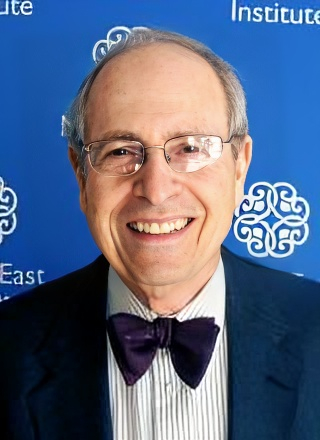
Trump has yet to lay out a detailed policy for South Asia, although he recently offered to mediate between India and Pakistan regarding the Kashmir dispute. Dr. Marvin G Weinbaum, an expert on Afghanistan and Pakistan, is of the view that that South Asian region will not be on the priority list of the new US administration. “It might be the second or third priority unless something blows up,” Dr. Weinbaum said on November 15 during a roundtable discussion at the US embassy. He also does not see any significant changes in the US policy on Afghanistan under the new administration rather there can be a surge of US troops. “I don’t think withdrawal will happen. I won’t be surprised if US sends 5,000 more troops” he added. Given urgency to shape a bigger-picture policy agenda, pivoting to South Asia and Pakistan will likely not be Trump’s first priority.
Afghan instability and Taliban advances are likely to prompt the Trump administration into slowing down the draw-down. Trump has stated that he would favour keeping nearly 10,000 US troops in Afghanistan “because it’s adjacent and right next to Pakistan which has nuclear weapons.” Fifteen years after the invasion, Afghanistan is still caught in conflict. “The people of Afghanistan are tired of war. We want (Trump) to invest heavily in bringing peace to war-torn Afghanistan and stabilize our region,” said Umer Daudzai, former Afghan minister of interior. “They should not cause damage to their economy and their military in this failed war,” Taliban spokesman Zabihullah Mujahid said.
Trump may be less hesitant than his predecessors in penalizing Pakistan for failures in Afghanistan instead of own cohorts. Afghanistan’s own failures at political unity, state cohesion and economic inefficiency will likely create tensions between any new US administration and Pakistan. Also Trump may not see aid as an incentivizing instrument for better cooperation. American political and military cultures have always focused on accountability with regard to military expeditions abroad, these are projected either as outright victories, or responsibility is squarely fixed for bogging down. Trump is likely to follow the tradition.
Trump is likely to court India for supporting America’s anti-China strategic pivot to Asia. Indian diaspora penetration into the Republican power structure is quite formidable. Trump’s embrace of hyper-nationalist governments like that of Narendra Modi, matching his own brand could come more naturally than bonding with Pakistan. However, for any global power, there may be no exits from strategically located Pakistan.
Reaction to Trump’s victory from the European Union has ranged from ‘cautiously neutral’ to ‘stunned’ with a German newspaper headlining ‘catastrophe’. There was no diplomatic Plan B in Europe in the event of a Trump win. Hillary’s victory would have delivered a range of known quantities and qualities. It would have had a sense of familiarity as well. Trump’s win has delivered uncertainty. Expectedly, President Putin has expressed his satisfaction.
Palestinian President Mahmoud Abbas called on Trump to work towards a Palestinian state. “We are ready to deal with the elected president on the basis of a two-state solution and to establish a Palestinian state on the 1967 borders,” said presidential spokesman Nabil Abu Rudeina. Israeli Education Minister Naftali Bennett, who also heads the hard-line Home party said, “Trump’s victory is an opportunity for Israel to immediately retract the notion of a Palestinian state”.
Indian Prime Minister Narendra Modi also congratulated Trump. “We look forward to working with you closely to take India-US bilateral ties to a new height,” Modi said in a tweet. One Hindu nationalist group in India held a victory gathering. “He’s an American nationalist. We are Indian nationalists. Only he can understand us… “We expect him to support us when it comes to terrorist attacks on India from Pakistan.” said Rashmi Gupta of the Hindu Sena.
As regards America’s domestic canvas, in the name of improving Homeland Security, some of the dormant and abandoned post 9/11 laws, in their revamped form, are being seen as worth re-implementation with respect to immigration, profiling and registration. Even though some of these had been overturned by the American superior judiciary and others were thought to be no longer relevant in view of their inconsistency with America’s obligations with regard to Human Rights.
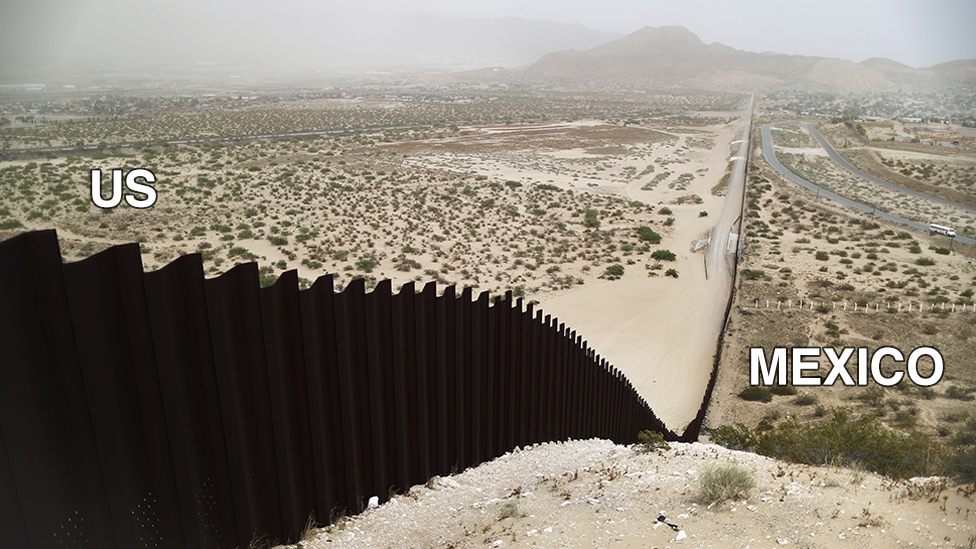
The Trump administration may go ahead with speedy construction of a US-Mexico border wall through an executive order, bypassing congressional approval. Even though both houses of the Congress have Republican majority, singly and conjointly, yet, Trump has apprehensions that Congress may stand in the way of such regressive lawmaking and approvals. Trump had pledged to step up immigration enforcement against the country’s 11 million undocumented immigrants. Revocation of the 2012 order granting temporary deportation relief and work permits to more than 700,000 undocumented children of illegal immigrants is also being contemplated.
Trump said on November 13, in an interview on CBS’ “60 Minutes”, that once he took office he would remove immigrants with criminal records who are in the country illegally: “What we are going to do is get the people that are criminal and have criminal records, gang members, drug dealers, we’re getting them out of our country, they’re here illegally.” However, America looks forward to securing the border before getting on to any statutory immigration measure. The raising of a deportation force is not on the cards. Trump referred to undocumented migrants without criminal records as “terrific people”. He did not describe in detail what his policy would be toward them.
The US already has a large infrastructure for arresting, detaining and deporting migrants. Over eight years, Barack Obama deported more than 2.5 million people, more than any other president, and more than doubled the number of border patrol agents. He has also increased border surveillance, and contracted the country’s largest prison company to help detain migrants. Obama had pursued immigration reform but failed to press a bipartisan bill through Congress in 2013 and 2014.
To implement Trump’s views on “extreme vetting” of some Muslim immigrants, a proposal is under consideration for reinstating a national registry for immigrants and visitors from Muslim countries who enter the US on visas from countries where extremist organizations are active. A similar National Security Entry-Exit Registration System (NSEERS) was imposed by President Bush after 9/11, whereby people from “higher risk” countries were required to undergo interrogations and fingerprinting on entering the US. This law was abandoned in 2011 after it was deemed redundant by the Department of Homeland Security and criticized by civil rights groups for unfairly targeting immigrants from Muslim-majority nations. Trump campaign has also restored ‘Muslim ban’ proposal on website that was earlier presumed to have been taken down on November 08.
Trump’s economic policy stance has been evident in his oft-repeated inward-looking pronouncements. Statements such as the ‘Brexit-plus plus’, road to reversing globalization and trade integration indicate an agenda that places the revival of American economy first. Globalization engendered inequalities have been at the heart of Trump’s economic policy declarations. Reversal and or renegotiation of some of the earlier trade agreements and policies may be on cards. The core elements of trade policy include imposition of higher tariffs on imports in general, and from China and Mexico in specific. Under the circumstances, Pakistan’s desire of preferential access to the US market may not bear fruits.
America being the world’s largest importer with a share of almost 14 per cent in world imports, imposition of higher tariffs will naturally be detrimental to world trade. And even then the US economy may not gain because attempt to push domestic manufacturing may imply higher costs and inefficient production. As the largest export market for India with a share of 15 per cent in India’s total exports, higher tariffs in the US may dilute India’s existing comparative advantage in the IT services and other sectors.
Moreover, any US initiative towards protectionist instruments is likely to be countered by retaliatory measures by other economies, including China. And a pullout from the TPP may prop up the Regional Comprehensive Economic Partnership (RCEP) agreement, which is seen as an alternative trade configuration to the TPP for the Asian economies, as the main trade agreement for Asian economies minus the US.
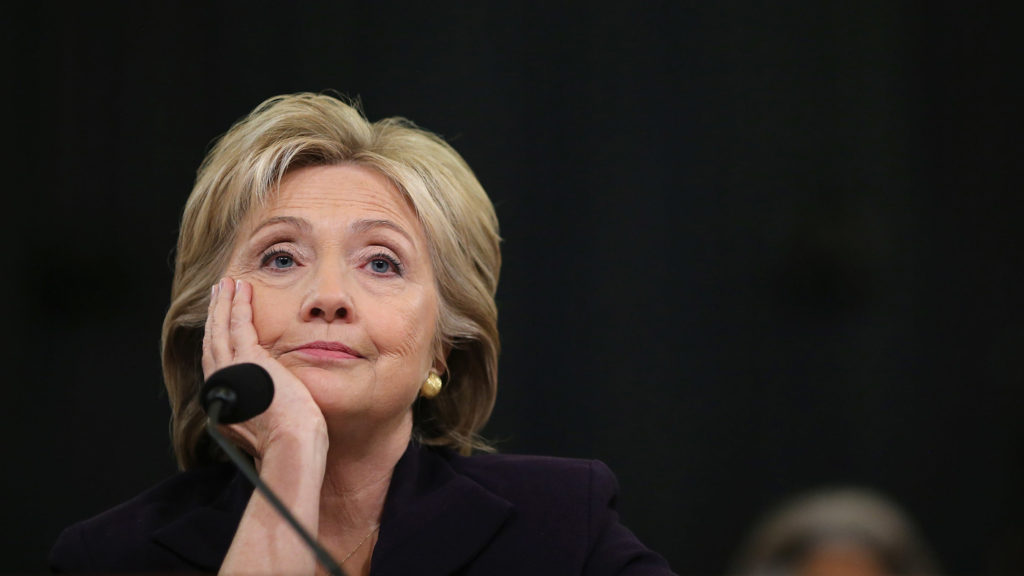
Trump could, at least in theory, reshape the fabric of US policies, both qualitatively and quantitatively through exercise of an unprecedented hold on all state institutions, inter alia, both chambers of Congress, the White House and judicial appointments. This is enormous critical mass of power, vested in a single party since 1928. Such preponderance of power, in a single individual—the President of the US is likely to have its implications, both for the better and or for the worse.
By and large, Americas have overcome the electoral shock. Hillary may never be able to reconcile, her lifetime ambition stands shattered, with no possibility of a third attempt. In his victory speech Trump shunned electoral rhetoric and tried to convey a reconciliatory message towards Americans as well as the world community. He has vowed to be the President of all Americans, he would soon begin to walk the talk through balanced statements and overtures. He will, most probably not pursue most of his electoral rhetoric. However, his erratic personality traits could come back in circles to haunt him, his voters, rest of Americans and the World at large. His pathological inclination to walk the path of indiscretions may lead to regime change through impeachment or other means towards the end of his first term—his Vice President and dissident Americans would remain hopeful of this distinct possibility.
However, if Trump is able to click and tick he may become another Ronald Reagan and accomplish a couple of marvels. It would soon become clear, whether he remains the President of “Trump Towers” or elevates himself to become a global leader.
Now the responsibility of safe steering rests with the Republican Party, power engine of this party too has a strong anti-Trump sentiment and hence, limited leverage. Trump has often spoken of Republican Party leaders with staggering disdain when they failed to endorse him. He didn’t seek their confidence, he demanded it and taunted them when they wavered. He stands above the party and is not likely to behave as if he owes it anything—especially his presidency.
It is too early to pass an accurate judgment on Trump’s behavior as President. With uncertainties abundant, the entire World is poised the keep fingers crossed. Alongside rest of the world, Pakistan waits to see how Trump unfolds his priorities. While caution is in order, panic is not called for. Safeguarding Pakistan’s interests will certainly need vigilance and a proactive approach to navigate the complexities of new face of power—albeit a crude one.


